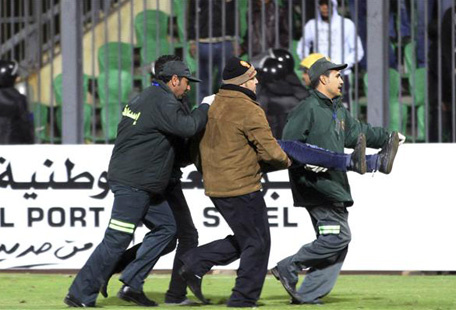Military Council; A Sacrifice in the Battle between Policy and Football

IRD: The deaths of 74 persons during a football match in Egypt plunged the country into crisis. What does it show?
AB: Egypt is now experiencing a transition crisis, beginning from the former regime due to the past year’s uprisings. As all of the former regime’s officials have not been eliminated in the political scene and the decision-making and legislative institutions are not well integrated into the system yet, there are some periods known as anomia in sociology, and called a transition period in which the country leaves a stable situation to enter another one.
IRD: Why did the occurrence take place on Wednesday?
AB: Egyptians think the struggle between the two teams’ supporters took place because of the involvement of Mubarak’s agents and the ignorance of the military rulers. On the other hand, the result of their clash was that the presence of the police and security forces had not been appropriate, an issue evident from the first whistle of the match. But when it comes to the events occurring in this match, instigating factors existing in the mind of the people on the involvement of Mubarak’s agents come into play, pushed by Mr. Tantawi and the other military rulers. This issue confirms the transition nature of the status quo where no particular group can take full control, even though elections have been held with the Akhavan al-Moslemin as the winner. They have accused the military forces and council of falling short in fulfilling their tasks.
IRD: In the transition phase, how are such events natural?
AB: Such an event can never be called natural, particularly in sports, and even FIFA announced this event as unprecedented, since it was a unique example of violence by the beaten team’s supporters against those of the winner. It is more the lack of political stability after the political events, protested by the opponents of the political system and various groups. On the other hand, these protests occurred in a field where fair play is advocated and justifiable. This was not natural, even in a post-revolution country after an election that ended with more than 70 percent of the votes gained by the Islamists, a situation in which charges of electoral fraud were expected. One supposes that unexpressed political frustration led to the bloodshed on the pitch.
IRD: How does this occurrence lead to a widening gap between the Egyptian people and the Military Council?
AB: An optimistic interpretation is that there is no required political stability in the country and most of the protests are the result of interpersonal problems. Tantawi’s regime and the Security Council announced three days of public mourning. The measure taken to divert the protests against themselves was the resignation of the governor and dismissal of the head of the Egyptian football federation. The council has announced that the province’s security official and the security council of the province were to be interrogated, as they were responsible for the event. The viewpoint mostly expressed by the Akhavan al-Moslemin and the people is that in the transition situation, at any gathering-- whether for sports or political activities-- the provincial security council should provide security to prevent such events; this viewpoint has pushed the Military Council to resist the pressure exerted by the West, the upheavals, and rise of the Islamists in Egypt.
A pessimistic analysis is that considering the upheavals, there is an insecure situation as announced by the Military Council and controlled best by the council. This viewpoint is rejected by the people. They believe that the military high council is a leftover of Mubarak’s regime that as soon as possible should vanish, and through which the appropriate context for the presidential election is provided. Yesterday, according to announced statistics, about 5 thousand people gathered in front of the ministry of interior, leaving 950 protesters and police forces injured, while only 303 of them were sent to the hospitals. It is hoped that the people’s demands will be met. Certainly, the presidential election should be held on time according to the constitution and the timetable, otherwise the transition phase may be an obstacle, preventing progress in other Egyptian plans.
*Dr. Ahmad Bakhshi is the African affairs expert.

